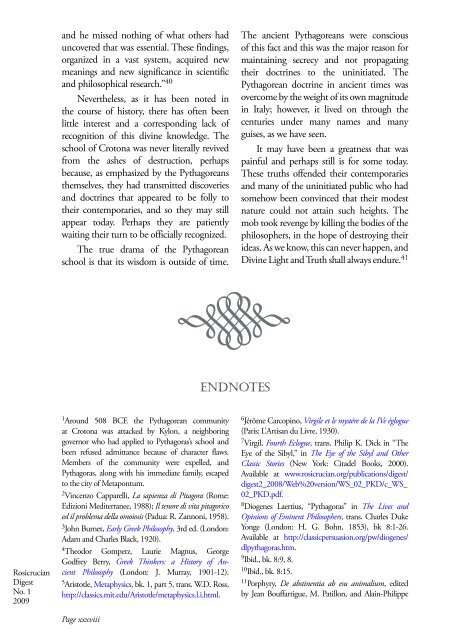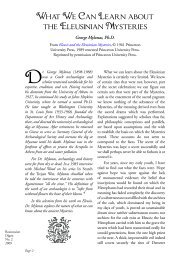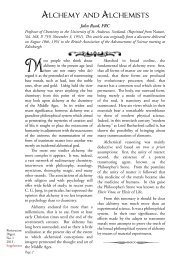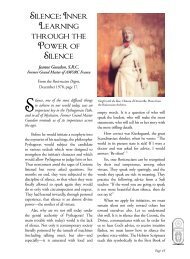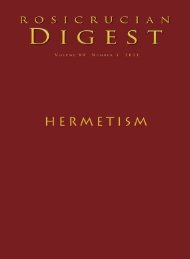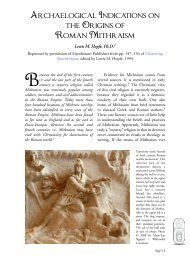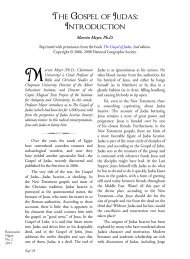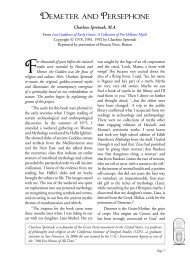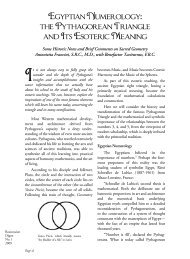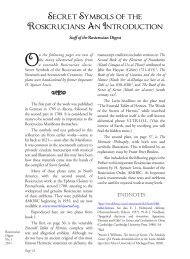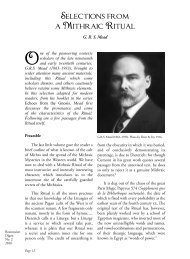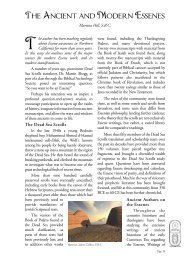Pythagorean Teachings across the Centuries - Rosicrucian Order
Pythagorean Teachings across the Centuries - Rosicrucian Order
Pythagorean Teachings across the Centuries - Rosicrucian Order
Create successful ePaper yourself
Turn your PDF publications into a flip-book with our unique Google optimized e-Paper software.
and he missed nothing of what o<strong>the</strong>rs had<br />
uncovered that was essential. These findings,<br />
organized in a vast system, acquired new<br />
meanings and new significance in scientific<br />
and philosophical research.” 40<br />
Never<strong>the</strong>less, as it has been noted in<br />
<strong>the</strong> course of history, <strong>the</strong>re has often been<br />
little interest and a corresponding lack of<br />
recognition of this divine knowledge. The<br />
school of Crotona was never literally revived<br />
from <strong>the</strong> ashes of destruction, perhaps<br />
because, as emphasized by <strong>the</strong> <strong>Pythagorean</strong>s<br />
<strong>the</strong>mselves, <strong>the</strong>y had transmitted discoveries<br />
and doctrines that appeared to be folly to<br />
<strong>the</strong>ir contemporaries, and so <strong>the</strong>y may still<br />
appear today. Perhaps <strong>the</strong>y are patiently<br />
waiting <strong>the</strong>ir turn to be officially recognized.<br />
The true drama of <strong>the</strong> <strong>Pythagorean</strong><br />
school is that its wisdom is outside of time.<br />
The ancient <strong>Pythagorean</strong>s were conscious<br />
of this fact and this was <strong>the</strong> major reason for<br />
maintaining secrecy and not propagating<br />
<strong>the</strong>ir doctrines to <strong>the</strong> uninitiated. The<br />
<strong>Pythagorean</strong> doctrine in ancient times was<br />
overcome by <strong>the</strong> weight of its own magnitude<br />
in Italy; however, it lived on through <strong>the</strong><br />
centuries under many names and many<br />
guises, as we have seen.<br />
It may have been a greatness that was<br />
painful and perhaps still is for some today.<br />
These truths offended <strong>the</strong>ir contemporaries<br />
and many of <strong>the</strong> uninitiated public who had<br />
somehow been convinced that <strong>the</strong>ir modest<br />
nature could not attain such heights. The<br />
mob took revenge by killing <strong>the</strong> bodies of <strong>the</strong><br />
philosophers, in <strong>the</strong> hope of destroying <strong>the</strong>ir<br />
ideas. As we know, this can never happen, and<br />
Divine Light and Truth shall always endure. 41<br />
Endnotes<br />
<strong>Rosicrucian</strong><br />
Digest<br />
No. 1<br />
2009<br />
1 Around 508 BCE <strong>the</strong> <strong>Pythagorean</strong> community<br />
at Crotona was attacked by Kylon, a neighboring<br />
governor who had applied to Pythagoras’s school and<br />
been refused admittance because of character flaws.<br />
Members of <strong>the</strong> community were expelled, and<br />
Pythagoras, along with his immediate family, escaped<br />
to <strong>the</strong> city of Metapontum.<br />
2 Vincenzo Capparelli, La sapienza di Pitagora (Rome:<br />
Edizioni Mediterranee, 1988); Il tenore di vita pitagorico<br />
ed il problema della omoiosis (Padua: R. Zannoni, 1958).<br />
3 John Burnet, Early Greek Philosophy, 3rd ed. (London:<br />
Adam and Charles Black, 1920).<br />
4 Theodor Gomperz, Laurie Magnus, George<br />
Godfrey Berry, Greek Thinkers: a History of Ancient<br />
Philosophy (London: J. Murray, 1901-12).<br />
5 Aristotle, Metaphysics, bk. 1, part 5, trans. W.D. Ross,<br />
http://classics.mit.edu/Aristotle/metaphysics.l.i.html.<br />
Page xxxviii<br />
6 Jérôme Carcopino, Virgile et le mystére de la IVe églogue<br />
(Paris: L’Artisan du Livre, 1930).<br />
7 Virgil, Fourth Eclogue, trans. Philip K. Dick in “The<br />
Eye of <strong>the</strong> Sibyl,” in The Eye of <strong>the</strong> Sibyl and O<strong>the</strong>r<br />
Classic Stories (New York: Citadel Books, 2000).<br />
Available at www.rosicrucian.org/publications/digest/<br />
digest2_2008/Web%20version/WS_02_PKD/c_WS_<br />
02_PKD.pdf.<br />
8 Diogenes Laertius, “Pythagoras” in The Lives and<br />
Opinions of Eminent Philosophers, trans. Charles Duke<br />
Yonge (London: H. G. Bohn, 1853), bk 8:1-26.<br />
Available at http://classicpersuasion.org/pw/diogenes/<br />
dlpythagoras.htm.<br />
9 Ibid., bk. 8:9, 8.<br />
10 Ibid., bk. 8:15.<br />
11 Porphyry, De abstinentia ab esu animalium, edited<br />
by Jean Bouffartigue, M. Patillon, and Alain-Philippe


